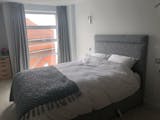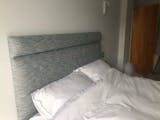When it comes to selecting the perfect bed, the choice between bespoke beds vs standard beds can be a significant one. Both types of beds have their benefits and drawbacks, and the right option for you depends on your needs, preferences, and budget. In this blog post, we will compare bespoke beds with standard, off-the-shelf models by examining factors like pricing, quality, comfort, and lifespan. We will also answer some common queries like, "Are bespoke beds worth the investment?" and "What makes bespoke beds better?"
Whether you're in the market for a new bed or simply exploring your options, understanding the difference between custom and pre-made beds will help you make an informed decision.
What Are Bespoke Beds?
Bespoke beds are made-to-order beds that are customized to suit your exact preferences. Unlike standard beds that are mass-produced, bespoke beds are crafted individually to fit specific dimensions, materials, styles, and comfort levels. From the headboard design to the type of mattress and frame, a bespoke bed allows you to personalize every aspect of the bed according to your taste and needs.
Bespoke beds are typically created by specialized manufacturers who offer a wide range of options, from materials and finishes to additional features like built-in storage or unique mattress support systems. These custom beds are often seen as a luxury option, as they provide personalized comfort and style.
What Are Standard Beds?
Standard beds, also known as off-the-shelf or pre-made beds, are mass-produced and available in fixed sizes and designs. These are the beds you can easily find in furniture stores or online retailers. Standard beds come in popular sizes like twin, double, queen, and king, with a variety of materials and designs to choose from. They are generally more affordable and readily available, making them a convenient option for many consumers.
Standard beds offer a wide range of options in terms of aesthetics, mattress types, and bed frames, but they lack the level of customization that bespoke beds provide. While standard beds can still deliver comfort and style, they are more limited in terms of personal preference and tailored features.
Pricing: Bespoke Beds vs. Standard Beds
One of the most noticeable differences between bespoke and standard beds is the price point.
Bespoke Beds
Custom beds are typically more expensive than standard beds due to the personalized craftsmanship and high-quality materials used. Every element of a bespoke bed, from the frame to the mattress, is created to meet your specific needs, and this level of customization comes at a cost. For example, you may choose a solid oak frame with custom detailing or opt for a high-end memory foam mattress tailored to your body shape.
The cost of a bespoke bed can vary widely depending on the materials and features you select, but expect to pay a premium compared to mass-produced models. Additionally, bespoke beds may require a longer lead time, as they are built to order and cannot be purchased and delivered immediately.
Standard Beds
Standard beds are generally more affordable, as they are mass-produced in large quantities, lowering production costs. Retailers can stock these beds in bulk, which also allows them to offer discounts and promotions. Standard beds can range from very basic, budget-friendly options to more luxurious models, but even the high-end standard beds are typically less expensive than their bespoke counterparts.
However, while the upfront cost of a standard bed may be lower, it’s important to consider how the quality and lifespan of the bed may affect its long-term value.

Featured Product: Memphis Metal Bed finished in Saffron Yellow
Quality: Custom vs. Pre-Made Beds
When it comes to quality, bespoke beds often stand out due to the attention to detail and craftsmanship involved in their production. However, there are also high-quality standard beds available, so let's compare the two.
Bespoke Beds
Bespoke beds are known for their exceptional quality. Since they are made to order, you have full control over the materials and construction methods used. This means you can choose premium materials such as hardwood frames, hand-stitched mattresses, or natural, organic fabrics. The result is a bed that is built to last, offering superior durability and comfort.
Additionally, bespoke beds are crafted with precision to meet your specific needs, ensuring that every aspect of the bed is tailored for optimal support and comfort. The level of quality control in a custom bed is higher than in a mass-produced model, as each bed is created individually with great care.
Standard Beds
Standard beds, while convenient, often vary greatly in quality. There are many options available on the market, ranging from budget-friendly models that use lower-quality materials to higher-end standard beds that can offer good comfort and durability. However, even the best standard beds are made for mass production, which means they may not have the same level of detail or craftsmanship as a bespoke bed.
One of the downsides of standard beds is that they may not be built with longevity in mind. Components like the bed frame or mattress support system may wear out faster than those in a bespoke bed, which could lead to the need for replacements sooner than expected.
Comfort: Personalized Comfort vs. General Comfort
When comparing custom vs pre-made beds, comfort is one of the most important factors for many people. While both bespoke and standard beds can be comfortable, the difference lies in how well the bed is suited to your individual needs.
Bespoke Beds
With bespoke beds, comfort is entirely tailored to your preferences. Whether you need a firmer mattress, specific mattress support for back pain, or even a bed designed for your body height, bespoke beds allow you to customize every detail for maximum comfort.
For example, you can choose the type of mattress filling (e.g., memory foam, latex, or pocket springs) based on your sleep habits, and you can have the bed frame adjusted to your height or room dimensions. This means that a bespoke bed can provide personalized comfort that standard models simply cannot match.
Standard Beds
Standard beds are designed to cater to the general population, so they are made with average sizes and comfort levels in mind. While they can still be very comfortable, they may not offer the level of personalization that some sleepers require. For example, if you have specific back or joint issues, a pre-made bed may not offer the ideal support system for your body type.
Standard beds do come in a variety of firmness levels and mattress types, but the range is limited compared to what is available with a bespoke bed. For people who don’t have specific comfort requirements, a well-chosen standard bed can still offer a good night’s sleep.
Lifespan: Which Bed Lasts Longer?
Durability is another key consideration in the custom bed comparison. Let’s take a closer look at how bespoke and standard beds compare in terms of lifespan.
Bespoke Beds
Bespoke beds are often built to last a lifetime. With high-quality materials and precise craftsmanship, these beds are designed for longevity. Custom beds typically use solid materials, such as hardwood frames and premium mattress fillings, which resist wear and tear better than mass-produced models. Because you can control every aspect of the bed’s construction, you can ensure it meets your standards for durability.
Additionally, bespoke beds are often easier to repair or update if needed. Since the bed was made specifically for you, the manufacturer can provide replacement parts or refurbishments that extend its lifespan even further.
Standard Beds
The lifespan of a standard bed can vary greatly depending on the quality and materials used. While some high-end standard beds can last for many years, budget models may need replacing after a few years of regular use. Standard bed frames made from particleboard or lower-quality metals may start to show signs of wear sooner than a custom bed made from solid materials.
Mattresses for standard beds also tend to wear out more quickly, particularly if they are made from lower-quality foam or springs. For those who need a long-lasting solution, a bespoke bed may be a better investment in the long run, even though the initial cost is higher.

Featured Bed: Sandringham Shaker Bed finished in Chocolate Brown
Are Bespoke Beds Worth the Investment?
One of the most common questions people ask is, "Are bespoke beds worth the investment?" The answer depends on what you value most in a bed.
If you prioritize personalization, longevity, and top-tier quality, then a bespoke bed is certainly worth the investment. The ability to tailor every aspect of the bed ensures that you get exactly what you need for a comfortable, long-lasting sleep solution. Additionally, bespoke beds offer higher durability, which means fewer replacements over time, making them more cost-effective in the long term.
On the other hand, if you are on a budget or simply need a reliable bed without the bells and whistles, a standard bed can still be a good choice. There are many high-quality off-the-shelf beds that offer comfort and durability without the need for customization. In these cases, a standard bed provides excellent value for money.
What Makes Bespoke Beds Better?
When comparing bespoke beds vs standard beds, bespoke models stand out due to several key factors:
- Customization: Bespoke beds offer unparalleled customization, allowing you to design the perfect bed for your needs. From the frame size to the mattress type, everything is tailored to your preferences.
- Higher Quality: With bespoke beds, you can choose premium materials that result in superior durability and comfort.
- Longevity: Bespoke beds are designed to last longer, which makes them a worthwhile investment for people who want a bed that will stand the test of time.
- Unique Design: Bespoke beds can be made to match the aesthetic of your bedroom perfectly, offering a unique, one-of-a-kind design that reflects your personal style.
Conclusion: Which Bed Is Right for You?
Choosing between bespoke beds vs standard beds ultimately depends on your individual needs, preferences, and budget. Here's a final breakdown to help you decide which option is best for you:
Choose a Bespoke Bed If...
- You value personalized comfort and want a bed designed specifically to meet your unique requirements, whether it’s the size, mattress type, or special features.
- Quality and longevity are your top priorities, and you’re looking for a bed that will last for decades with minimal need for replacement.
- You want a custom design that fits perfectly within your room’s décor and overall aesthetic, making your bed a focal point of the bedroom.
- You are willing to invest in a premium product for long-term value, knowing that the upfront cost will pay off in terms of durability, comfort, and style.
Choose a Standard Bed If...
- You’re looking for a more affordable option and don’t have specific requirements that necessitate a custom-made product.
- You need a bed quickly—standard beds are readily available and can often be delivered in just a few days.
- You’re furnishing a guest room or a room that won’t see everyday use, so longevity and personalized comfort aren’t as important to you.
- You’re content with a pre-set design and don’t need the bed to have unique or custom features.
In the end, whether you opt for a made-to-order bed or stick with a pre-made bed, both can provide a great night’s sleep—it’s simply a matter of determining which option aligns better with your specific needs and priorities.







